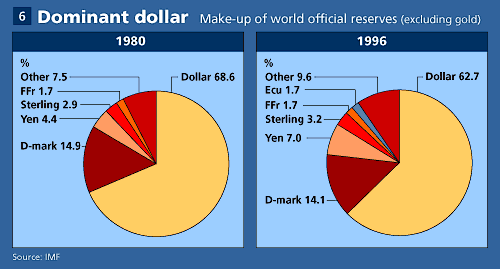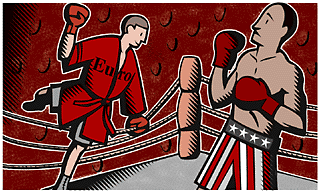|
The big uncertainty is how fast this will happen. And that in turn prompts the capital markets’ favourite question about the euro: will it be strong or weak? In particular, will it appreciate or depreciate against the dollar? As befits markets, this question has plenty of competing answers.

In one corner stands Fred Bergsten*, director of the Institute for International Economics. He expects the European Central Bank to be credible, and to pursue a tight monetary policy. There are several good reasons, he thinks, for expecting the euro to appreciate. One is that international portfolio investors will switch a chunk of their holdings out of dollars and into euros. Another is a possible double effect on foreign-currency reserves: a sale by euro countries of their “excess” reserves, most of which are held in dollars; and a switch of some third-country reserves into euros.

Mr Bergsten reckons the combination of these factors could produce a one-off net flow from dollars into euros of between $500 billion and $1 trillion—easily enough to push up the euro’s value. But that is not all. The euro countries will also run a current-account surplus in 1998 of around 2% of GDP, whereas the United States, already the world’s biggest debtor, is heading for a record current-account deficit. And the European countries are starting from a position of weakness against the dollar, so some appreciation in 1999 can be expected.

The Bergsten case seems strong. Yet there are plenty of doubters, not least in central banks—including the Federal Reserve. The euro, they point out, will be untested; the markets will take time to get to know it. In any event, the strength of a currency depends on supply as well as demand; as the euro takes off, there will be no shortage of sellers, for instance of bonds, bank loans and securities, to match buyers. Against this, says Richard Portes of the Centre for Economic Policy Research, it is plausible to assume that “liability managers will not react as fast as asset managers.”

Yet no sensible asset manager would want to switch quickly into euros if he seemed to be driving the market up against him. And the foreign-exchange markets, with their turnover of well over $1 trillion a day, can swamp even large-scale portfolio shifts. It seems more likely that, as now, the relative strengths of the dollar and the euro will depend on market sentiment, growth prospects and the mix of fiscal and monetary policy on both sides of the Atlantic. In other words, nobody can know whether the euro will go up or down.

Life at the top

Nor does anybody know how quickly the euro will challenge the dollar for world hegemony. Inertia comes into it: sterling played a world role for many years after Britain’s economy had ceased to justify such eminence. But it may be sooner than many Americans expect. The benefits America has enjoyed from the dollar’s role as world currency are easy to exaggerate, but the ability to borrow without limit in its own currency has enabled the United States to become the world’s biggest debtor with equanimity, and to continue to run huge current-account deficits. The American Treasury has also reaped seignorage (the profit a government makes on issuing currency) worth as much as 0.5% of GDP from the use of dollar bills in other countries.

Indeed, one reason for creating the euro was to ensure that, as one European Commission official puts it, “the inordinate privileges of the dollar will go.” The arrival of the first plausible post-war challenger to the dollar will certainly make it harder for America to run unlimited current-account deficits, or to exercise unchallenged leadership of the international financial system.

Nor might the rise of the euro be comfortable for the international monetary system. The last time that rival world currencies vied for position was when sterling and the dollar co-existed in the 1920s and 1930s, a time of international monetary turmoil. Arguably, the world has never lived with two more or less equal world currencies. Could more international turmoil lie ahead?

One pointer is that the euro countries will be less concerned about their exchange rate than in the past. The ECB is bound by statute to give priority to price stability. Moreover, at present foreign trade accounts for a third or more of most European countries’ GDP, but in the euro-11 group the share of exports in GDP will fall to only just over 10% (because the bulk of their trade is with each other). That will make the euro economy as relatively closed as those of America or Japan. Combine this with the emergence of the euro as a world currency, and you have a recipe for “benign neglect”.

This is a much-used and -abused phrase. Even in the 1970s, when John Connally, the American Treasury secretary, declared that “the dollar is our currency but your problem,” he was overstating his case. In truth, policymakers in America have never been able to ignore the exchange rate altogether. The same will be true in the euro area. Yet volatility will impose fewer immediate costs than before. There is therefore a chance that both sides will practise benign neglect and thus increase volatility.

If so, it will not do the international monetary system any good. Last year’s Asian crisis was triggered partly because of huge swings in the dollar/yen rate, which has been more volatile than the dollar/D-mark rate. If the euro/dollar rate turns out to gyrate similarly, there could be plenty of collateral damage. Asia may be especially vulnerable, to the point where it might consider establishing its own rival to the dollar and euro. Mr Bergsten urges improved international co-ordination to handle the fall-out.

This may or may not be desirable. But either way it immediately runs into another big issue: who is in charge of the euro? Similarly, who will speak for the euro at G7 summit meetings, or at the International Monetary Fund and the World Bank? These questions are only just beginning to be asked, and most European governments have chosen to ignore them for now.

In theory, the answer is clear. The IMF is an organisation of sovereign governments, so neither the EU nor the euro countries as a sub-group can be represented through votes or quotas. Much the same is true for the G7, although the president of the European Commission is invited as a courtesy. Once the euro arrives, national governments that are members of these organisations will continue as before: they will simply have to speak with one voice. The president of the ECB might also play a role; for instance, by attending G7 summit meetings.

Too many chiefs

Yet this is unlikely to last in practice. The Americans observe, pointedly, that Europe is already over-represented in the G7 and the IMF; giving an additional role to the ECB would make things worse. Besides, the ECB is not a government. In time, it seems more likely that the euro area will devise some form of external political representation, for both the G7 and for the IMF and World Bank. The euro can then take its place beside the dollar in the governance of the international monetary system.

Why is it so awkward to discuss this now? The answer is simple: because of Britain’s present policy of masterful indecision on EMU. If the euro were represented at political level on the international stage, it would become absurd for a country as small as Britain to play the role it does today. The G7 might quickly shrink to a G3; Britain could lose votes in the IMF; and who knows, even its permanent membership of the UN Security Council might come to be questioned.

This is just a small foretaste of the political ramifications the arrival of the single currency is likely to produce, both at home and abroad. Many of these have barely been explored, but they could be as controversial as anything else about the project.

*See paper by C. Fred Bergsten in “EMU and the International Monetary System”. Report of an IMF symposium in March 1997



|


